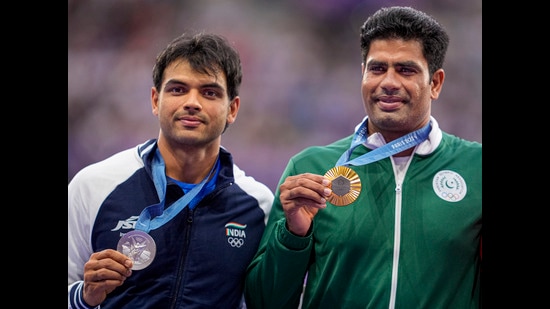Aug 17, 2024 08:57 PM IST
Punjabis share a unique bond across India and Pakistan, rooted in shared culture and history, transcending political divides. This connection explains the camaraderie between athletes like Neeraj Chopra and Arshad Nadeem.
Have you ever thought about how Punjabis view Pakistan? It’s distinctly different to the rest of the country. In fact, I would imagine the closest parallel is how Bengalis view Bangladesh. Both states were divided at Partition, and nostalgia and affection for the lost half has not dimmed. If anything, it seems to pass down the generations.

Perhaps this is why the Neeraj Chopra-Arshad Nadeem story was headline news for the rest of the country but an unexceptional outcome for Punjabis. And, before I go further, let me remind you that Haryana, until 1966, was for centuries a significant part of the undivided Punjab. Ambala and Rohtak were as Punjabi as Lahore and Ludhiana.
So, it is not surprising Neeraj and Arshad would gravitate towards each other. Not just their sport but their culture determined it. They have more in common with each other than either do with their Grenadian, European or American fellow athletes. That they would embrace and laugh, speak warmly of the other and, even, share a bond — which is so obvious — is not unusual. The opposite would be.
That’s also true of their mothers. The reason they don’t view their son’s rival as an opponent is because they sense the “Punjabi” connect. No doubt, this explains the striking similarity in the way they spoke. “I also pray for Neeraj”, said Arshad’s mother, Raziah Parveen, “he is also like our son.”
Saroj Devi, Neeraj’s mother, said virtually the same thing. “The one who got gold is also our child and the one who got silver is also our child.”
I first became aware of what I’m calling the Punjabi connection in 1980. I was visiting Lahore. It was my first trip across the border, and until I got there, I looked upon Pakistan as a foreign country. Of course, it was, but the people definitely were not. Nor was I strange and alien to them.
One evening at Salloos, in the old WAPDA building, I found I was the only guest in the restaurant. I prepared myself for a lonely dinner and a quick exit. How wrong I was. Within minutes of discovering I was a Punjabi from India, the restaurant staff walked up and asked if they could chat. When I agreed, they took charge. They ordered the choicest food, recommended the sights I must see in Lahore, insisted on replacing the warm rotis with fresh ones that were piping hot and kept topping up my plate till it resembled a wedding cake.
But it was their questions I’ll never forget. “Have you been to gali no x in Jullunder? My parents lived there”, I was asked. “Have you ever met Amitabh Bachchan and Rekha? I’m so keen to meet them”, was another question. “Tell me about Indira Gandhi. I want to know everything about her,” was perhaps the most surprising.
They were living their parents’ lives with a zest and enthusiasm as if it were their own. For them, India may have been another country, but the place where their parents were born was still home. I was, therefore, from a world that had been lost but far from forgotten. Sitting in Salloos, I was their new-found connect with it.
Now, 1980 was a good 44 years ago. A lot has happened since. The pre-Partition generation has died, politics divides and doesn’t fascinate us, and Bollywood films are no longer the same. And, yet, we still look alike, speak the same language, eat similar food and, even, curse with the same lingo! The only separation is religion and a line on a British-drawn map. The Punjabi connection is strong enough to overcome that.
This is what drew Neeraj and Arshad to each other. It’s also the reason why Indians and Pakistanis — whether Punjabi or not — gravitate to each other abroad. They feel comfortable in each other’s company. They don’t need to explain themselves. They know they’ll be understood. A shared culture is stronger than divisive politics. If only our politicians understood that.
Karan Thapar is the author of Devil’s Advocate: The Untold Story.The views expressed are personal


